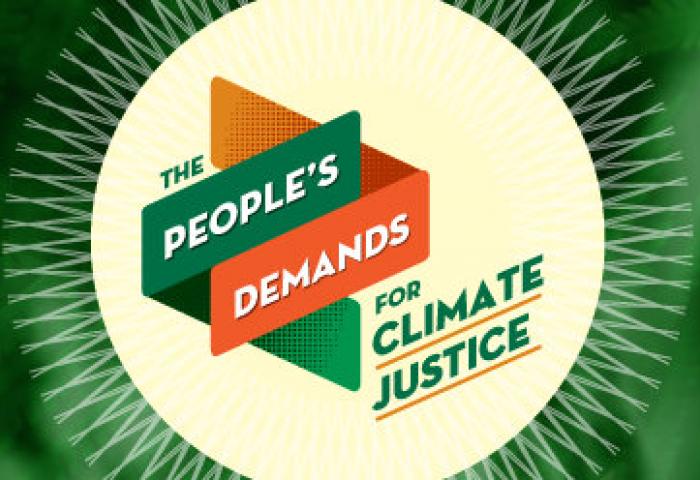Climate change is the crisis of our time. Its intensifying impacts are affecting millions of people around the world, the health of our planet, and is driving species extinction. It is disproportionately affecting the people and communities globally who have contributed the least to creating this planetary emergency.
This crisis requires urgent, vital, and ambitious action. And this ambition must center people’s lives and human rights, and be grounded in principles of equity and historical responsibility. This December, at COP24, government delegates will lay out the rules to implement the Paris Agreement, policies that will affect the lives of billions of people.
Countries and industries most responsible for emitting greenhouse gases, and for obstructing and delaying progress on averting the worst effects of this crisis, must be held accountable for their actions, and should bear the greatest responsibility in paying the costs of a global, just, and equitable transition to a 100 percent fossil fuel free future.
These are the People’s Demands, our call to government delegates, grounded in people’s movements from every continent, that demand with one voice what is our birthright: climate justice.
Keep fossil fuels in the ground
1. Developed countries pledge for a just and equitable transition to 100 percent Renewable Energy by 2030.
2. Governments phase out subsidies to the fossil fuel industry and pledge to divest fully from fossil fuels by 2020.
3. Pledge to an outright and immediate ban on fracking and adopt a global moratorium on new fossil fuel exploration and extraction techniques starting in 2018.
4. Agree to an international moratorium on new coal projects effective immediately.
Reject false solutions that are displacing real, people-first solutions to the climate crisis
1. Reject offsets and stop the transition of the Clean Development Mechanism into the guidelines for implementation of the Paris Agreement in the guise of the Sustainable Development Mechanism.
2. Honor the international Moratorium on geoengineering established by the Convention on Biological Diversity.
3. Reject Carbon Capture and Storage (CCS) and Bioenergy with Carbon Capture and Storage (BECCS) projects, and other technofixes.
4. Stop the conversion of local agricultural lands to non-food production purposes.
5. Reject REDD+, REDD-like projects, Internationally-Traded Mitigation Outcomes (ITMOs), and all forms of carbon trading schemes that undermine human and indigenous rights, including indigenous cultures, territorial sovereignty, and integrity.
6. Stop supporting and promoting burning biomass as renewable energy and reject the substitution of biofuels and bioenergy as an alternative to fossil fuels.
7. Reject corporate-fronted schemes promoting so-called “Climate Smart Agriculture”.
Advance real solutions that are just, feasible, and essential
1. Transform energy systems away from corporate-controlled fossil fuels and other harmful sources such as nuclear, mega-hydro, and biofuels to a clean, safe system that empowers people and communities.
2. Support ecological restoration to recover natural sinks, and stop all projects that are extremely destructive of Earth’s natural capacity to absorb greenhouse gases.
3. Support global efforts for a just and equitable transition that enables energy democracy, creates new job opportunities, encourages distributed renewable energy, and protects workers and communities most affected by extractive economies.
4. Commit to policies that embrace agro-ecological practices and food sovereignty in place of “Climate Smart Agriculture”.
5. Facilitate and support non-market approaches to climate action.
6. Adopt a technology framework that recognizes the importance of endogenous and indigenous technologies and innovations in addressing climate change, and enables developing countries and communities to develop, access, and transfer environmentally sound, socially acceptable, gender responsive and equitable climate technologies.
7. Respect and enable non-corporate, community-led climate solutions that recognize the traditional knowledge, practices, wisdom, and resilience of indigenous peoples and local communities, and protect rights over their lands and territories.
8. Ensure participatory and transparent assessment of all proposed climate technologies and reject barriers to technology access and transfer such as intellectual property rights.
Honor climate finance obligations to developing countries
1. Replenish the Green Climate Fund to ratchet up climate action to stay below 1.5 degree Celsius global temperature rise, and fulfill developed countries’ commitment to provide $100 billion a year by 2020.
2. Provide adequate and real money (in addition to Overseas Development Assistance) to scale up adaptation and ensure protection to climate migrants and those impacted by climate change.
3. Developed countries must make new concrete pledges of public climate finance accompanied by a definite timeline for delivery.
4. Commit to climate reparations to those most affected but least responsible for climate change.
End corporate interference in and capture of the climate talks
1. Advance a conflict of interest policy that protects Paris Agreement implementation and global climate policy from obstruction by Big Polluters, and mandates governments take action at the national level.
2. Prohibit industries that profit from fossil fuels and the climate crisis from influencing international and national climate policy forums.
3. Reject every attempt by corporations and their proxies to insert themselves into the negotiations.
4. Advance a call to hold corporations accountable for the impacts of decades of misinformation and political interference in climate policy.
Developed countries must honor their “Fair Shares” for largely fueling this crisis
1. Developed countries must publicly recognize and act on their greater historical responsibility for greenhouse gas emissions.
2. Ensure developed countries take ambitious action in accordance with their historical responsibility and capacity, with ambitious domestic targets (including the rapid phase out of fossil fuel extraction and dirty energy subsidies), international cooperation, and support for global climate finance and Just Transition in developing countries.
3. Drastically increase the ambition of domestic commitments and global targets to limit warming to 1.5 Celsius and ensure such commitments are set in accordance with science and equity.
Original source / Image credit: The People's Demands for Climate Justice

